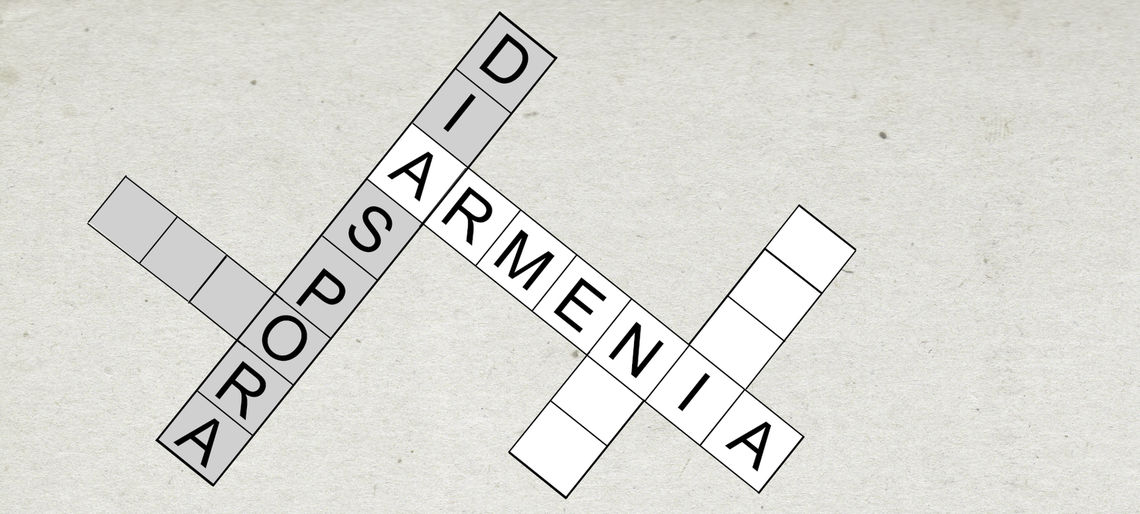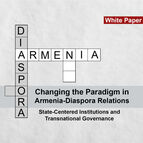

Nation-states, like Armenia, which have large Diasporan communities spread all over the world, are challenged to formulate legal, institutional, and infrastructural mechanisms that would accommodate both citizens living in the state as well as those residing outside the territories of a state. Despite its strength and resources, it is important to acknowledge that the Diaspora is a stateless entity, and it is the responsibility of the origin-state to develop the necessary institutional and transnational infrastructures that would organize and govern Armenia-Diaspora relations. The current state of Armenia-Diaspora relations shows a lack of such infrastructures and a need for a paradigm shift that would replace the ad-hoc efforts by the diasporic communities and organizations with more state-centered bureaucratic structures.
The state-centered development of Armenia-Diaspora relations is needed to first of all address the disconnect between Armenia and the Diaspora and align their interests and views. By defining Armenia-Diaspora relations through state-centrism, it would also be possible to elevate the role of the origin-state as the one alleviating the problems faced by the Armenian world and offering the structural support required to strengthen Armenia-Diaspora relations.
The two primary reasons for the existing disconnect are the nationalism of the Diaspora and the inactivity of the Armenian state which as a result produced two diverging paradigms for the Armenian nation. On the one hand, the Diaspora is nationalistic and devoted to Armenian national identity, while on the other hand, Armenia is patriotic and loyal to the Republic of Armenia. For Diasporan Armenians, the state is excluded from their notion of nationalism and is not perceived as an inherent component of their national identity. The state-centric approach would not only facilitate the development of transnational infrastructures, but also strengthen the Diaspora, Armenia-Diaspora relations, as well as prioritize the role of the Armenian state in the Diaspora identity formation.
To enhance relations with their diasporas, an increasing number of origin-states around the world develop state-centric Diaspora institutions as part of the executive or legislative branches. Ethiopia, Poland, Latvia, Indonesia, Haiti, Nigeria, and Armenia are among the countries with such formal structures that were developed to utilize the vast resources of their diasporas and systematically advance Homeland-Diaspora collaboration. Aside from bureaucratized institutions, it is equally crucial to have non-governmental, quasi-non-governmental and transnational organizations that would supplement the state’s efforts in developing relations with its diasporic communities.
Four main factors can be identified in order to explain the need for a Diaspora identity formation based on the state-centric model. First, robust Diaspora organizations allow states, especially small states like Armenia with complicated geopolitical circumstances, to raise the profile of domestic politics, extend it beyond the national borders, and make it part of the international discourse. Second, state-centric Diaspora institutions “spatially reconfigure states,” so that for countries like Armenia, the concept of the nation is no longer defined by the territorial boundaries, but rather by the broader Armenian world. Third, Diaspora organizations give Diasporans the formal and legal recognition as an extension of the origin-state. Efforts such as granting dual citizenship or integrating them into the state governance, are crucial for elevating a Diasporan’s responsibilities towards the Homeland. And finally, over the years, the sustainability of the Armenian Diaspora has become increasingly dependent on the Armenian state, which consequently, requires the expansion of resources allocated by the Diaspora institutions.
Strategic and cultural relations, as well as governance structures are the three main spheres that Armenia needs to capitalize on while advancing its relations with the Diaspora.
The sphere of strategic relations entails the calculated and organized efforts of the origin-state to utilize the human capital of its Diaspora, as well as the vast economic and political resources. Tapping into the Diaspora’s economic resources, has mostly been in the form of direct foreign investments and philanthropic donations and has played a pivotal role in the sustenance of the Armenian economy. The role of the Diaspora institutions, which in the case of Armenia is the Office of the High Commissioner for Diaspora Affairs, in attracting more diasporic communities to invest in, travel and donate to Armenia has to be expanded. Tapping into the Diaspora’s human capital by developing a comprehensive registry of professionalized experts and inducing their inflow through “reverse brain drain” is of equal importance. Research shows that utilizing a diaspora’s human capital, instead of developing domestic research and development programs is an economically preferable approach. And finally, the political resources of the Armenian Diaspora has played a critical role in advancing the interests of the Armenian state worldwide. However, the absence of the Armenian state from this process and the minimal support provided to Diaspora lobbying structures and their endeavors, has made the success very limited.
The sphere of cultural relations is the foundation upon which strategic relations are developed. It pertains to the historical, identity, educational, artistic and intellectual forms of cultural variables that bridge Armenia and the Diaspora. In contrast to the strategic relations, however, here the relationship is reversed because it is the Diaspora that taps into the origin-state for support to sustain its national identity. Even though the Armenian state has been more involved and active in the cultural sphere, the efforts were still ad hoc and lacked a formal and transnational infrastructure. The role of the Diaspora institutions of the origin-state in introducing arrangements that systematically guide the cultural relations between Armenia and the Diaspora should not be overlooked. It is by embracing diasporans through cultural affinity that the Homeland can eventually encourage repatriation.
The sphere of governance structures refers to infrastructures that facilitate and manage the political, economic, and cultural relations between the Homeland and Diaspora. Similar to strategic and cultural relations, it is preferable to have governance structures that are developed as formal institutions and serve the interests of the Diaspora and the origin-state. In this context, Diaspora governance is an important concept, because diasporas are no longer identified as “fixed social groups” that reside in other states, but rather a diasporan is considered to be a potential constituent for the Homeland. Thus, domestic policies need to be crafted in a way that have resonance both in the origin-state as well as beyond the boundaries of the state. The vision of Armenia’s post-Velvet Revolution government towards constituency building is fundamentally different from the pre-Velvet Revolution governments. Compared to its predecessors, the current government is actively engaged in constituency building with the Diaspora. The notion of state-led transnationalism, however, where domestic policies affect those residing in the origin-state and the Diaspora has not been developed yet.
When speaking about the implementation of policies of Diaspora governance structures, it is important to address the issue of enforcement, since Armenia does not have any enforcement powers in the Diaspora. The concept of “transnational governmentality” suggests that the policies developed by the origin-state need to be enforced not through coercion but rather through consent. According to this model of enforcement, by advancing the interests of Diaspora constituents and by making them stakeholders, the Armenian state incentivizes them to be governed by the policies of the origin-state. In order for the transnational governmentality to work effectively, two factors need to be considered. First of all, the democratic nature of the origin-state is important, because the Diaspora constituents are less likely to agree to be governed by a non-liberal regime. And second, deterritorialized practices of inclusion are also worth considering, since evidence shows that inclusive origin-states are more successful in exercising transnational governance.
While developing transnational Diaspora structures, it is critical to acknowledge that the formed structures need to be in compliance with the idea of transnational governmentality and that they cannot be all encompassing structures. For transnational Diaspora structures to serve their goal effectively, which is building constituencies in the origin-state as well as the Diaspora, it is also pivotal to realize that the Diaspora cannot be viewed as a single body, with a unified set of beliefs, goals, and interests. Thus, for the effective engagement of the Diaspora in the process, it should be prioritized to:
1. align the interests of the Diaspora constituents with that of the origin-state;
2. recognize and accommodate the diverse interests of Diaspora communities; and
3. formulate transnational structures that promote the alignment and give the Diaspora-constituents agency.
For Armenia-Diaspora relations, the policy recommendation regarding the transnational Diaspora structures is the formation of quasi-governmental institutions, which are state centric structures that offer the origin-state flexibility to address the diverse needs of its Diaspora. South Korea, Peru, Mexico and Israel are among the countries with successful examples of quasi-governmental institutions. Advisory councils and emergency councils, in specific circumstances, are the two quasi-governmental institutions that are recommended for Armenia. The goal of the advisory council should be to:
1. provide Diaspora constituents agency through which they can influence policy changes;
2. allow the transnational governance by the Homeland by establishing the terms and conditions of advisory councils;
3. increase the effectiveness of the Diaspora’s resources by including the Diaspora in the decision-making process, and
4. align the goals and interests of the origin-state with the Diaspora.
In order for the transnational advisory councils to effectively fulfill their goals, separate councils, composed of qualified Diasporan expert professionals, should be designed for a diverse range of sectors. Some examples include an advisory council of scientists, advisory council of economists, and an advisory council of legal experts. The advisory councils will be formalized structures through which Diasporan experts will have the power to introduce policy recommendations for the Homeland as well as deepen Armenia-Diaspora relations.
Considering Armenia’s geopolitical circumstances and complexities, the formation of transnational emergency councils that would offer the Diaspora formal agency to support the Homeland in times of crisis, is of equal importance. Diaspora Emergency Council (DEC) should be specifically designed for quick mobilization, resource allocation and transfer from Diaspora to the origin-state during emergencies. The policy recommendation is to establish DECs in strategic locations, where large Armenian Diaspora communities are based, including the United States, Canada, Latin America, France, Russia, Middle East, and Australia. Similar to the advisory councils, emergency councils will also be comprised of qualified professionals and will require a developed coordination system to maximize the efficiency of the resource allocation. DECs will be under the direct supervision of the Office of the High Commissioner for Diaspora Affairs and will be coordinating their work with the High Commissioner during emergencies.
The 1988 Spitak earthquake, the Karabakh/Artsakh war, and the 2016 Four Day War are the three data points which illustrate the need for quasi-governmental emergency councils and for more coordinated mobilization of resources during a crisis. These are also examples showing that the lack of coordinated efforts between the Diaspora and Homeland can lead to wasted time and resources, as well as inefficient utilization of Diaspora’s political resources.
Changing the Paradigm in Armenia-Diaspora Relations
How should Armenia-Diaspora relations develop moving forward? This new White Paper argues that relations must be defined through state-centered institutions and transnational governance.
Read moreAlso read
White Paper on Transitional Justice
Primer: Transitional Justice
Transitional justice is a form of exceptional justice, since it is introduced for a specific period of time to deal with exceptional circumstances. This primer is based on Dr. Nerses Kopalyan’s White Paper, Transitional Justice Agenda for the Republic of Armenia and is a summary of the key points of transitional justice.
Read morePrimer: Future Prospects for Foster Care for Children with Disabilities in Armenia
Every child has the right to live in a family. Today, more than half of all children in orphanages have disabilities. This a primer of EVN Report’s White Paper about specialized foster care for children with disabilities .
Read morePrimer: Volunteering in Armenia, Key Issues and Challenges
Why do people volunteer, how is volunteer work regulated and what are the key issues the volunteering sector faces in the Republic of Armenia? This is a primer of EVN Report’s White Paper, “Volunteering in Armenia: Key Issues and Challenges.”
Read moreThis project is funded by the UK Government’s Conflict, Stability and Security Fund.
The opinions expressed are those of the authors’ and do not necessarily reflect the official position of the UK Government.







